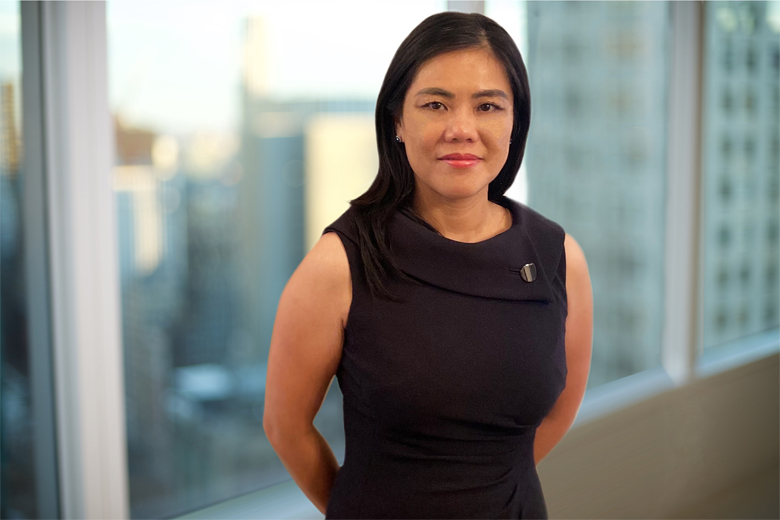
O’Melveny continued its Texas expansion this week with the addition of energy dealmaker Monica Hwang.
The LNG expert has practiced for the last 14-plus years in King & Spalding’s Houston office. O’Melveny, which has not officially opened a Houston office, lists Hwang as part of the firm’s Dallas and Austin outposts.
“As the world continues to demand cleaner, more efficient forms of energy, Monica brings a rare practice strength that will immediately benefit our clients,” O’Melveny Chair Bradley J. Butwin said in a statement. “She will join with our colleagues in Austin and Dallas — and with energy-focused lawyers across the firm — to guide clients on innovative LNG projects, other complex energy transactions and cutting-edge initiatives, including carbon sequestration and green hydrogen.”
Hwang has advised on many of the largest “mega-LNG” ventures, including Freeport LNG’s $14 billion export terminal, Total’s $20 billion Mozambique project and Wheatstone’s $29.7 billion plant in Australia.
Outside of her law practice, the University of Houston Law Center graduate is a dedicated volunteer with Habitat for Humanity, having made numerous overseas trips to build homes as part of the organization’s Global Village program. She also serves on the steering committee of the United Way of Greater Houston’s Women’s Initiative.
Hwang elaborated on her move and discussed key developments in the LNG space, which saw the cancellation of at least 175 cargos during Covid but has experienced a significant bounce back since, in a Q&A with The Texas Lawbook.
The Lawbook: Why did you make the move to O’Melveny?
Monica Hwang: Three main reasons.
1) O’Melveny’s powerhouse project finance team, which has been recognized by Law360 three times within the past five years as Project Finance Group of the Year, including for financings in the energy space. As energy clients look to develop new infrastructure, the firm’s project financing capabilities will be helpful. I look forward to collaborating with my project finance colleagues to expand our energy footprint and provide an end-to-end legal solution for our clients.
2) O’Melveny’s expertise in technology is a plus as we see increasing collaboration between technology and energy companies. My technology colleagues will offer guidance to energy clients moving into innovative spaces and technologies (e.g., bitcoin mining; carbon capture), and I look forward to offering energy industry support to technology clients.
3) O’Melveny’s reputation in Asia is at the top of the market, bar none. I have worked on many trans-Pacific transactions and expect to see a resurgence of those transactions. I see tremendous benefit of wearing the O’Melveny badge as I meet Asian clients or see them across the table.
The Lawbook: Have you worked across from anyone at O’Melveny before?
Hwang: I have not been directly across from O’Melveny before. I see this as a bonus as we will have a lot of synergies as we introduce each other to our respective contacts.
Interestingly, Jeff Hoffner and I worked on different aspects of the same deal for a power client as associates. I am sure we will be working together on matters shortly.
The Lawbook: What are two or three of the most interesting deals you have handled recently?
Hwang: My LNG-to-power transactions are always interesting because I am likely the only non-Spanish speaking Asian-American lawyer active in the Latin American energy space. I really enjoy the sophisticated players and the collaborative nature of negotiations on those deals. There are many innovations being made in that space, including power generators moving towards the terminal to procure LNG and LNG suppliers investing into downstream infrastructure.
I worked on Mozambique LNG for many years. It is a monumental project for that country and I always appreciate being able to support a project to final investment decision.
Not many lawyers get to work on these mega projects ($10 to $20 billion). I am grateful to have had the opportunity to work on several mega projects and each is as memorable and interesting as the next.
The Lawbook: What are the emerging trends or key developments in the LNG space?
Hwang: It has been a roller coaster ride in LNG the past two years. With COVID shut-downs, it was reported that at least 175 cargos were cancelled last year. With COVID restrictions being lifted this year, we saw the reverse and prices have really spiked. Accordingly, announcements of many new transactions have been made this year. I definitely expect more long-term buyers will emerge and more FIDs will be forthcoming within the next 12-18 months.
The Lawbook: What is keeping your clients up at night?
Hwang: For my LNG developer clients, I would say trying to capitalize on this window to sign up customers. These are high-stake projects involving multiple disciplines, from marketing to project structure and equity-debt capital raises. The development cycle is long but it all starts with marketing.
For all energy clients, I would say innovating with the trends on technology and climate change. Energy clients are resilient and keen on participating in new opportunities that make sense. One example is how quickly many companies invested in renewable biogas.
The Lawbook: Is there anything else you would like to add?
Hwang: The reception from my colleagues has been wonderful and I look forward to building our market presence in Texas.
